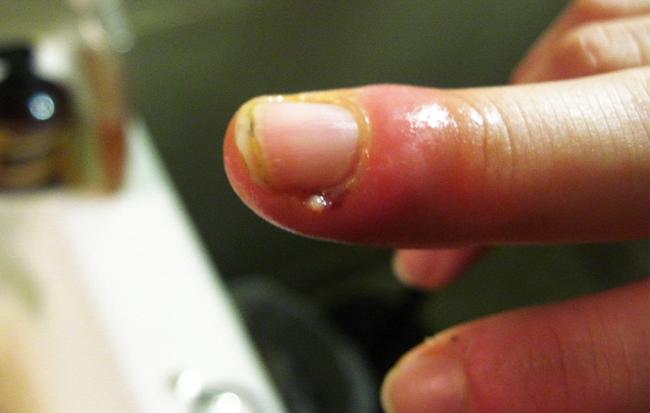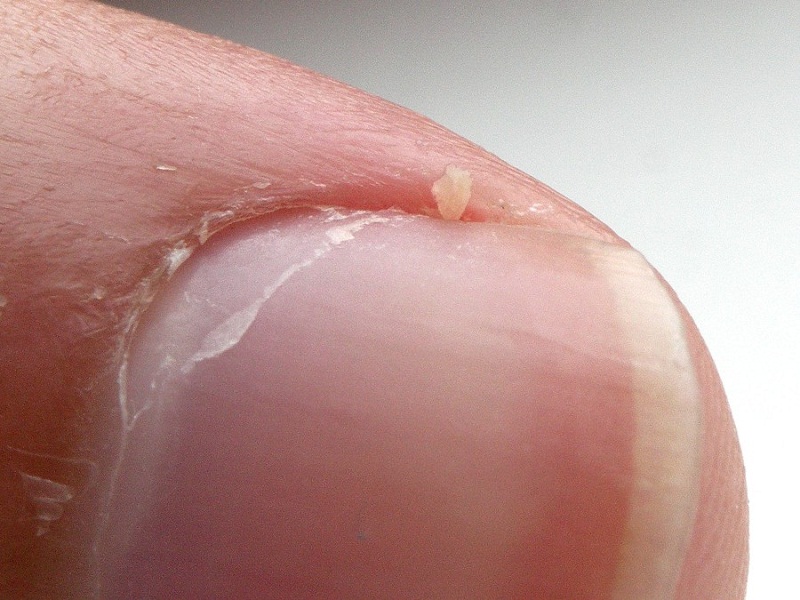
WHAT ARE HANGNAILS?
First of all, hangnails aren’t part of your nail at all—they’re actually made of skin cells that form small, tag-like projections near the nail, says Dawn Davis, M.D., dermatologist at the Mayo Clinic. They occur when the skin separates from the surface, but still remains anchored at the base.
People with dry skin seem to get them more frequently, says Dr. Jacobs. That’s because skin dryness leaves your skin more vulnerable to damage from elements like cold weather or water, which can trigger the skin separation.
The reason they hurt so badly simply comes down to their location.
“Hangnails are usually at the end of a digit near the nail. There are many nerve endings and blood vessels in this area,” says Dr. Davis.
Hangnails also cause inflammation, so that swelling can press on the nerve endings and irritate them, leading to more pain. If your hangnail is inflamed, not only will it hurt, but you’ll also notice redness and swelling, too.
HOW TO TREAT HANGNAILS
Avoid the temptation to rip the little suckers off. Not only will yanking off inflamed tissue hurt like hell, but you’re also leaving your fingers prone to infection.
“When you pull them off, you typically tear some of the normal surface skin that keeps out bacteria,” says Dr. Jacobs. “When you pull off a hangnail, you can develop an infection of the surrounding skin.”
So it goes without saying that ripping off a hangnail with your teeth is definite no-go. Not only is your mouth full of germs, but so are your hands, so you’re putting yourself at a much higher risk of infection.
Why Your Gym Is Germier Than Your Bathroom:
Instead, if you do notice a hangnail, follow these steps to take care of it.
First, take a warm shower to soften your skin. Sanitize a fingernail clipper or nail scissors with rubbing alcohol, and then cut the hangnail off close to the normal skin level, says Dr. Jacobs.
“Apply a lotion with low alcohol and water content, as these will dry the skin out more,” he says. Moisturizing the area is important because it protects your skin from drying out, lowering the likelihood of hangnails happening (These are the best grooming products to save your dry skin).
If your hangnail is already pretty painful and red, it’s likely already inflamed. An inflamed hangnail isn’t necessarily an infected hangnail—yet—but you’ll need to keep an eye on it during treatment.
In this case, treat inflamed hangnails with ice and over the counter pain medication to help with the symptoms, and topical antibiotic ointment,” says Dr. Jacobs. An antibiotic ointment can help prevent an infection from developing.
But if it’s already inflamed and infected? In that case, the pain will likely be more severe, and the redness and pain can spread over a larger area. You’d feel pain and tenderness near the hangnail and in the area around the hangnail.
Another telltale sign? Drainage, or pus, from the area.
If you have concern that there may be an infection, you should seek medical attention, as you may need oral antibiotics.
HOW TO PREVENT HANGNAILS
There are a few things you can do to protect your hands from getting hangnails.
The first, keep your skin hydrated to prevent it from drying out, leaving your more susceptible to hangnails, says Dr. Jacobs.
“Using topical hand lotion on a regular basis will help keep the skin softer and avoid dryness. Particularly in winter months when everything is trying to dry your skin, apply lotion regularly, like after showering and after hand washing,” he says.
And wear gloves, too—both when you’re outside in the cold air, and when you’re washing to dishes, since the hot water and soap can be drying. “People who work in the cold and people with chemical contact or prolonged water exposure are more susceptible to hangnails,” says Dr. Jacobs.

